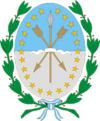Santa Fe Province
| Santa Fe | |||
|---|---|---|---|
| Province | |||
|
|||
 Location of Santa Fe Province within Argentina |
|||
| Country | Argentina | ||
| Departments | 19 | ||
| Districts | 365 | ||
| Municipalities and communes | 352 | ||
| Capital | Santa Fe de la Vera Cruz | ||
| Government | |||
| • Governor | Miguel Lifschitz (FPCyS - PS) | ||
| • Legislature | Chamber of Deputies (50) Senate (19) |
||
| • National Deputies |
19 |
||
| • National Senators | Carlos Reutemann, Omar Perotti, María de los Ángeles Sacnun | ||
| Area Ranked 10th |
|||
| • Total | 133,007 km2 (51,354 sq mi) | ||
| Population (2010) | |||
| • Total | 3,194,537 | ||
| • Rank | 3rd | ||
| • Density | 24/km2 (62/sq mi) | ||
| Demonym(s) | santafesino | ||
| Time zone | ART (UTC−3) | ||
| ISO 3166 code | AR-S | ||
| Website | www |
||
The Province of Santa Fe (Spanish: Provincia de Santa Fe, Spanish pronunciation: [ˈsanta ˈfe]) is a province of Argentina, located in the center-east of the country. Neighboring provinces are from the north clockwise Chaco (divided by the 28th parallel south), Corrientes, Entre Ríos, Buenos Aires, Córdoba, and Santiago del Estero. Together with Córdoba and Entre Ríos, the province is part of the economico-political association known as the Center Region.
Santa Fe's most important cities are Rosario (population 1,193,605), the capital Santa Fe (369,000), Rafaela (100,000), Villa Gobernador Gálvez (74,000), Venado Tuerto (69,000), Reconquista (66,000), and Santo Tomé (58,000).
The adult literacy rate in the province is 96.3%
The aboriginal tribes who inhabited this region were the Tobas, Timbúes, Mocovíes, Pilagás, Guaycurúes, and Guaraníes. They were nomadic, lived from hunting, fishing and fruit recollection.
...
Wikipedia


